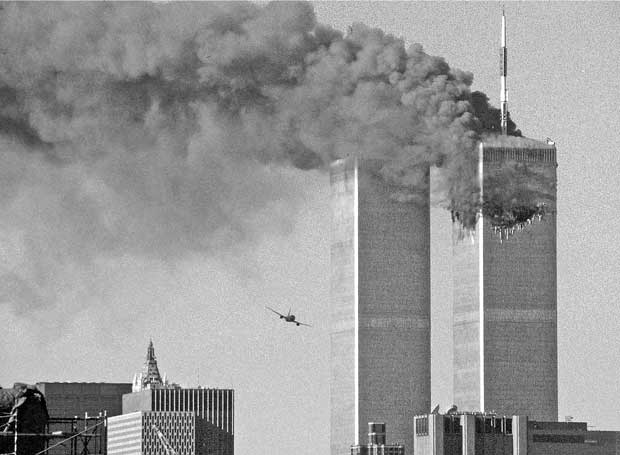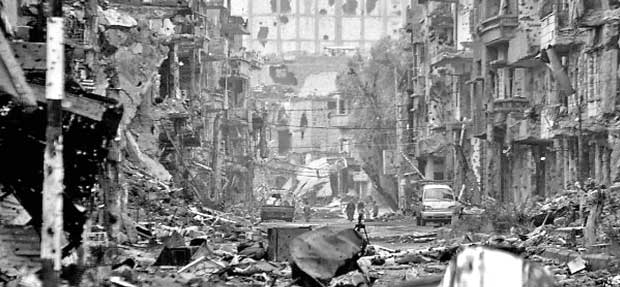Reply To:
Name - Reply Comment
Last Updated : 2024-04-25 22:12:00

The war on terror that followed the September 11, 2001 Attacks in the United States has left a bloody and devastating trail of conflict ridden societies with Middle East, North Africa inheriting a decade and half of total violence and state failure leading to myriad of regional crises. Yet last few weeks in global affairs may have been a unique period in the whole 16 years since the beginning of the war on terror campaign officially launched on October 7, 2001 by the United States to uproot the Taliban from  Afghanistan. Global news agencies and media reported less and less of terrorism or extremist driven violence, and instead was dominated by a new fear of all out war in Asia and possible nuclear war in the Korean peninsula whilst the shock and awe of mother nature has further distracted both nuclear and terror debates.
Afghanistan. Global news agencies and media reported less and less of terrorism or extremist driven violence, and instead was dominated by a new fear of all out war in Asia and possible nuclear war in the Korean peninsula whilst the shock and awe of mother nature has further distracted both nuclear and terror debates.
Yet many realities exist with new global and domestic social and political transformations that are taking place at unprecedented speeds, and the articulation of violent extremism still persists and in some context gaining momentum each day. Yet the strategic position of the key states that championed the war on terror remains constant with just tactical moderations, resulting in such states consistently losing the strategic capability to deal with violent extremism. Extremist elements have managed to survive and thrive even at great costs and military defeats.
 A Syrian city reduced to rubble and debris following Syrian Army's offensive against ISIS
A Syrian city reduced to rubble and debris following Syrian Army's offensive against ISIS
The US state department listed the names of 28 terror groups in 2002, by 2010 it was nearly 50 and currently stands at 61. The costs of the war are staggering; it is staggering both for the US led alliance as well as the states and people that are victims of the conflict. For the Americans the cost of the war on terror has reached an astounding 5 Trillion dollars. Yet the number of insurgents they are fighting are increasing in all theatres the war on terror is unfolding from 13 Islamist groups in 2002 by 2015 it had increased to 44 groups and from a mere 30,000 odd fighters with the recent recruitment drives of ISIS and its affiliates active fighter numbers have increased to 100,000.
The intention of this column is not to castigate the United States as the catalyst for all evil, instead critically analyse and explain when the most powerful country on earth errs and provides erroneous strategic guidance in combating a global adversary the consequences are shared by almost all, thus there is a certain responsibility for the United States for course correction and providing resources to implement necessary actions to prevent further crises.
In the last two years alone, all major cosmopolitan European cities from Paris, Brussels, to Manchester had experienced terror attacks, softer targets with hard political consequences
Yet this is complicated by a set of new factors, the primary factor is that the global position of the United States and its international standing has become precarious. It is no longer the hyper power it was at 2001, it is still the most decisive military power on earth but not the hegemony. The war on terror has come at both a global and domestic cost for the United States from economic slowdown,  military overreach, massive domestic governance under- reach creating domestic political chaos and a foreign policy that lack a coherent strategy to deal with the complex global challenges of the day.
military overreach, massive domestic governance under- reach creating domestic political chaos and a foreign policy that lack a coherent strategy to deal with the complex global challenges of the day.
The stalling of the war machine that led the war on terror coupled with some new realities are bringing in more actors to deal with extremists, yet their intentions may be different. The best example is the Russian campaign in Syria and the only key terror related developments that took place last week was Russian military support to the Assad regime to break the 3 year old siege of the township of Deir ez-Zor by ISIS fighters, among a few of the last remaining ISIS strongholds in Syria.
The Russian military support or the Iranian involvement in Syria may have different set of strategic expectations than what the Americans perceived in creating a global alliance against terror when they initially launched the war on terror. Its primary deviance from American led efforts was that it was not using the campaign against Islamists with the intention of regime change. Regime change was a cornerstone of American foreign policy when it came to the war on terror.
Another critical factor is that the war on terror though it had many allies was purely driven by American interests primarily to prevent terrorist attacks against the United States, its citizens, its interests, and to augment that protection to US allies. Thus critical reflections by strategists and academics claim that US is still not safer from terrorism and at the same time the threat was inflated which took important focus away from other strategically important issues and actors in global politics that the United States should have focused and made policy adjustments.
US President Donald Trump made some signature election pledges, defeating radical Islamic terrorism was one of them, yet in his August 2017 review of American policy in Afghanistan he claimed that the US needs to completely defeat and be victorious against radical elements in Afghanistan. Thus it seems sadly what the current administration is not realizing is the fact that the central challenge to today’s turbulent world is not a single strategic fix, especially in the context of the recession of American power and influence in global affairs.
Sixteen years on from the 9/11 attacks that created a new historical epoch in the policy and academic debates about international security there are some enduring realities. Terrorism is not the number one challenge to global stability it comes in the form of breakdown of the existing global order, emergence of multiple contending national powers for regional and global dominance, expanding nuclear rivalries such as the Korean dilemma and expanding the gulf between the privileged few and diminishing middle class.
Yet extremist ideologies seem to benefit from the above mentioned global turmoil. Thus extremism coupled with violent manifestations still has major repercussions for state stability, economic prosperity and political security. In the last two years alone, all major cosmopolitan European cities from Paris, Brussels, to Manchester had experienced terror attacks, softer targets with hard political consequences.
A greater concern that is engulfing counter terror experts is the ultimate fallout from a total defeat of ISIS. With the fall of Mosul Iraqi government broke the back of the Islamic State and with impending defeats in Syria, the fear is that ISIS will strategically reinvent itself as a fully blown insurgency group and will swarm and distribute its international fighters to a multitude of global locations. ISIS has the potential to be a terror swarm unlike any the global security community has ever experienced.
Such fully-blown insurgencies will seriously test the current, one dimensional counter terror strategies and narratives that lead states in the anti terror battle that has adopted. With a smart, agile and multifaceted adversary states are no longer confronted by fanatics that are mindless and senseless. Instead they are confronting extremists who are sophisticated, modern, tech savvy, in control of narratives, skilful recruiters and politically intelligent.
Sri Lanka Army concluded their most recent Colombo Defence Seminar few weeks ago on the theme of countering violent extremism, the writer chaired the crucial final panel which anchored the group workshops comprising of local and international military officers. The biggest take away was that the conventional wisdom was not sufficient to deal with evolving forms of violent extremist architectures. Public private partnerships, global information sharing, education, intelligent counter narratives form a critical bulwark against eternally metastasising conflicts that leave us all vulnerable and unsafe, as we have unconsciously consented to the fact of living with terror while trying to fight it, such a tragic departure from where it all started.
The writer is the Director, Bandaranaike Centre for International Studies (BCIS)

Add comment
Comments will be edited (grammar, spelling and slang) and authorized at the discretion of Daily Mirror online. The website also has the right not to publish selected comments.
Reply To:
Name - Reply Comment
US authorities are currently reviewing the manifest of every cargo aboard MV
On March 26, a couple arriving from Thailand was arrested with 88 live animal
According to villagers from Naula-Moragolla out of 105 families 80 can afford
Is the situation in Sri Lanka so grim that locals harbour hope that they coul